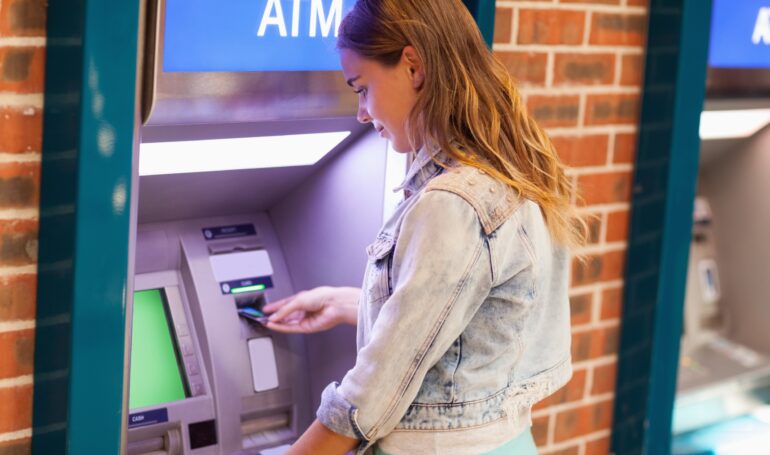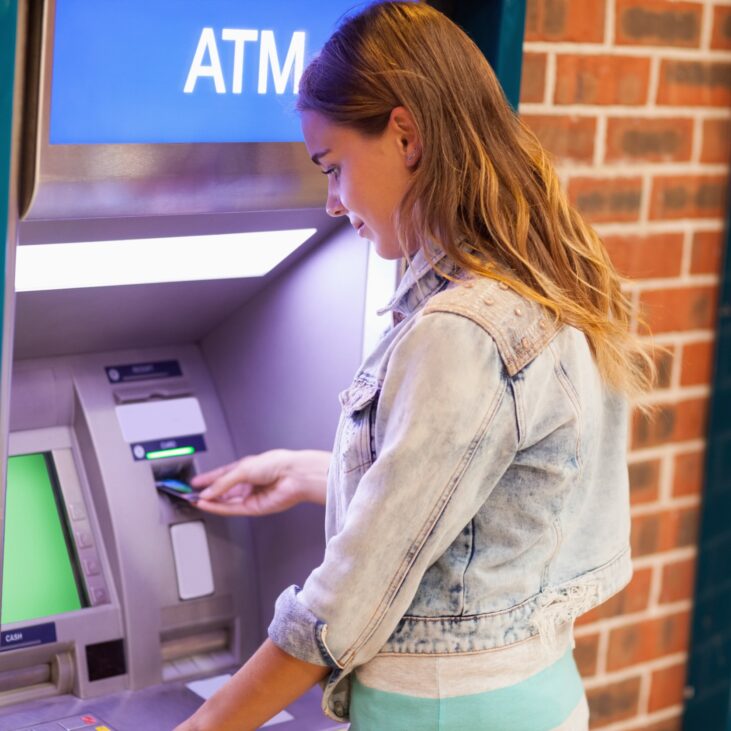Takeaways
- Credit card cash advances are a fast way to access the cash you otherwise do not have.
- Interest on a cash advance starts accruing immediately, making advances expensive.
- The interest rate on a credit card cash advance is generally higher than your credit card.
- A credit cash advance increases your credit utilization and lowers your credit limits.
- Weigh the cost of the alternative to a credit card cash advance before taking one out.
How a Credit Card Cash Advance Works
A credit card cash advance is a feature offered by credit cards that allows you to withdraw cash, up to a specific limit, from an ATM or bank branch using your credit card. This can be thought of as using your credit card to "purchase" cash rather than goods or services.
To initiate a cash advance, you can use your credit card at an ATM much like a debit card, but you will need to know your credit card PIN. If you do not have a PIN, you may be able to request one from your card issuer, or you might be able to take your credit card to a bank teller and request an advance in person. You will be able to withdraw cash up to the limit set by your card issuer.
Smart Money -> 9 Alternatives to Credit Card Cash Advance
It is critical to understand that a cash advance is fundamentally different from a regular credit card transaction. For purchases made with your credit card, there is typically a grace period during which no interest is charged if the balance is paid in full by the due date. However, many lenders start accruing interest immediately on cash advances from the time the cash is withdrawn [1].
Smart Money -> 8 Steps to Pay off Credit Card Debt Fast
5 Disadvantages of a Credit Card Cash Advance
Cash advances are notably more expensive than regular credit card transactions for several reasons, making them a less desirable option for accessing cash. Here are five disadvantages of taking out a credit card cash advance:
1. High-Interest Rates
The interest rates on cash advances are typically higher than on regular-use transactions. When you take out a cash advance, the Annual Percentage Rate (APR), or cost of credit expressed as a yearly rate, is applied to the borrowed amount and is generally several percentage points above the APR for purchases [2]. This means you will be charged more interest from the get-go, which can accumulate quickly.
Smart Money-> What is a Credit Score?
2. Credit Card Advance Fees
In addition to higher interest rates, cash advances come with extra fees that further increase costs. Most credit card issuers charge a fee for cash advances, typically either a flat rate or a percentage of the amount withdrawn, whichever is greater. This fee can range from 2% to 5% of the advance amount, adding an immediate cost to the transaction. Furthermore, if you use an ATM to withdraw your cash, you might also be subject to ATM fees, adding another layer of expense.
Smart Money-> Top 12 Most Common Financial Mistakes
3. No Grace Period
Perhaps the most significant factor that makes cash advances expensive is the lack of a grace period. Unlike credit card purchases, where you typically have a billing cycle of about 30 days before interest starts accruing, interest on a cash advance starts immediately. From the moment the cash is withdrawn, the meter starts running on the interest, with no opportunity to avoid these charges by paying off the balance quickly.
Smart Money -> What is Interest: Definition and Examples
4. Available Funds Are Lower Than Your Credit Limit
Consumers with high credit scores enjoy high credit limits as well. If you fall into this category, you might think you can withdraw a cash advance up to your credit limits. That is not quite how the process works. Credit cards offering cash advances have a separate credit limit for cash advances lower than your credit limit. Check the fine print on your credit card account to see how much you can withdraw with a credit card cash advance.
Smart Money -> Need to Increase Your Credit Score by 100 Points? Here's How
5. Higher Credit Utilization
Perhaps the most significant factor that makes cash advances expensive is the lack of a grace period. Unlike credit card purchases, where you typically have a billing cycle of about 30 days before interest starts accruing, interest on a cash advance accumulates immediately. From the moment the cash is withdrawn, the meter starts running on the interest, with no opportunity to avoid these charges by paying off the balance quickly.
Smart Money-> 5 Steps to Lower Your Credit Utilization
How to Avoid Needing a Cash Advance
Most financial advisors suggest simply suggest to avoid needing a cash advance altogether. There are personal finance saving rules of thumb that help you distance yourself from finding yourself in a pickle for cash. Setting up a sort of “rainy day” fund can alleviate financial anxiety and add a protective layer between you and unexpected expenses. Avoid even having to think about a cash advance by setting up the following accounts:
Emergency Funds are the protective boundary between you and financial disasters. In a perfect world, you can start an emergency fund of at least $1,000 and build up to $3,000. If you are in a true financial emergency and need cash now, pull money from your savings account. However, if you need money to go to a concert or out with friends, consider whether this is really in your budget and if using this money adheres to your financial goals.
Slush Funds are the first place you should turn to if you are hunting for cash. Dipping into your emergency fund is not ideal, which is why saving a slush fund of at least 3 to 6 times your monthly expenses bolsters your financial health. Scooping from your slush fund is a smart money move during times of necessity.
Liquidate Short-Term Investments like savings in a high-yielding checking account, short-term certificates of deposits, money market funds, or investments in stocks or bonds. Ideally, you want these investments to run their course to maximize your investment return. But if you need cash, sell these liquid investments.
Smart Money -> 10 Best Ways to Invest $1,000
Quick Alternatives to Cash Advance
There are many alternatives to a credit card cash advance. Considering the high costs associated with cash advances, exploring alternatives can save money and avoid financial strain. Here are some quick and less expensive options for securing the cash you need when you are in a pinch:
- Personal Loans: A personal loan from a bank, online lender, or credit union can be a more cost-effective solution than a cash advance. The application process can be straightforward, with many lenders offering quick approval and fund disbursement, sometimes within a day or two.
- 401(k) Loans: When you need cash and do not already have an emergency or slush fund, you must be creative and look for pools of capital. For those already focused on retirement savings with an employer-sponsored 401(k) plan, this capital could help you out. A 401(k) loan allows you to borrow from your 401(k) plan and pay it back over time.
- Family or Friends: If borrowing money from family or friends is an option for you, consider taking this low-cost approach. Money can complicate relationships, so think long and hard about this option. Dealing with an independent third party might be the preferred solution.
- Credit Union Short-Term Loans: Many credit unions offer short-term loans designed to provide an alternative to high-cost payday loans. These loans often come with lower interest rates and more manageable repayment terms. This could be a viable option for you if you are a member of a credit union.
- Negotiated Payment Plans: If you need cash for a specific bill or expense, contacting the creditor to negotiate a payment plan can be a practical alternative. Many service providers and medical offices will work with you to set up a payment arrangement that fits your budget.
Smart Money -> Try the 50/30/20 Budget and Calculator
Smart Summary
Credit card cash advances can be the best option for you, but only in the right circumstances. Most finance professionals tell clients to explore all the alternatives available before taking out a credit card cash advance because it usually comes saddled with a high interest rate, which accrues interest immediately. You can buffer yourself from needing to consider a high-cost cash advance with financial planning.
(1) Federal Deposit Insurance Company. Credit Card Checks and Cash Advances. Last Accessed February 10, 2024.
(2) Consumer Financial Protection Bureau. Determination of Annual Percentage Rate. Last Accessed February 10, 2024.











